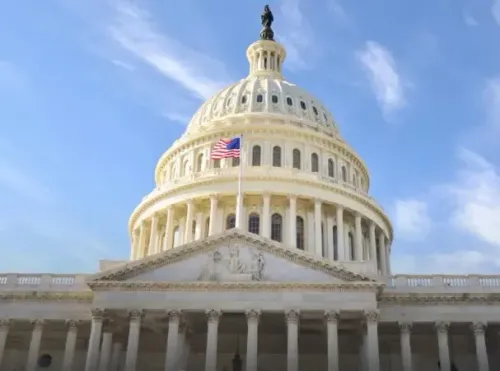Is the Bill to End H-1B Visas a Harmful Move for Americans?

Synopsis
Key Takeaways
- Proposed bill could harm U.S. access to healthcare.
- Reduction of H-1B visas may lead to increased wait times.
- Experts call for reform rather than elimination of the program.
- High percentage of H-1B visas go to Indian workers.
- Legal challenges against recent visa policy changes are ongoing.
Washington, Nov 15 (NationPress) A prominent immigration authority in Washington has described Republican Congresswoman Marjorie Taylor Greene’s initiative to abolish H-1B visas as “one of the most effective methods to harm Americans,” leading to more “preventable deaths.”
In an interview with IANS, Sarah Pierce, the Director of Social Policy at Third Way, a think tank, contended that Greene’s efforts to eliminate the visa program would “wipe out access to care instantly.”
“Reducing the influx of foreign professionals, including vital medical personnel relied upon by her own constituents, would devastate access to care immediately.”
On Friday, Greene reiterated on X her intention to propose legislation to “ban H-1B visas across all sectors” except for healthcare.
In a video shared on Thursday, Greene revealed her legislative proposals—restricting visas to just 10,000 annually, a drastic cut from the existing cap of 85,000.
She indicated that even this exception could be phased out within the next decade. Additionally, her proposal would eliminate the pathway to citizenship, mandating that visa holders return to their home countries.
Pierce emphasized that Greene's proposal for 10,000 visas for healthcare professionals would still result in more “preventable deaths.”
“The current H-1B program facilitates a far greater number of medical professionals than her arbitrary 10,000-visa limit permits. This legislation would leave American families, especially in rural regions, with fewer physicians, increased wait times, and more preventable fatalities. It’s a cruel policy masquerading as a solution,”
she stated.
Pierce recognized that some U.S. tech workers have experienced job losses due to the H-1B program, but dismantling the entire initiative is “both misleading and perilous.”
“Abolishing it or overwhelming it with punitive fees would cripple the U.S. economy and threaten essential sectors,”
she asserted.
Prominent Republican and conservative figures have called for the elimination of H-1B visas after former President Donald Trump defended the foreign worker visa program.
In a discussion with Fox News’ Laura Ingraham on Tuesday, Trump was asked if his administration intended to deprioritize H-1B visas, to which he responded, “You must bring in talent.”
When Ingraham countered, “We have plenty of talent,” Trump replied, “No, you don’t.”
“Certain talents are lacking… People need to understand that you can't just take individuals off an unemployment line and expect them to work in specialized industries like manufacturing missiles,”
he added.
Ingraham also responded to a CNN debate on the topic by posting on X, “America's survival relies on its continued import of foreign workers—are they all geniuses?”
The White House clarified on Wednesday that it is focused on addressing alleged abuses in the visa system rather than abolishing it completely.
Trump signed a proclamation in September imposing a $100,000 fee for new H-1B visa applications.
Last week, the U.S. Department of Labor (DOL) initiated at least 175 inquiries into potential abuses within the H-1B visa program.
Pierce insisted that instead of “scapegoating” the program, Congress should take the initiative to reform it.
“Congress should engage in the challenging work: reform the program so it genuinely benefits American workers and families. The reality is straightforward—we need more physicians, more home-care aides, and yes, more high-skilled tech professionals if we want this nation to thrive,”
she said.
The administration’s H-1B visa policies have already faced legal challenges, including two significant lawsuits filed in courts, one by the U.S. Chamber of Commerce, the largest business organization in the country.
Pierce expressed her expectation that these cases would likely succeed, yet highlighted the difficulties faced by applicants currently navigating visa challenges.
“I would be surprised if the legal actions do not prevail. Unfortunately, even if they do, that doesn’t alleviate the burdens on applicants who are currently facing exorbitant fees,”
she remarked.
Workers from India received over 70% of the total approved H-1B visas in 2024, primarily due to significant backlogs in approvals and a high number of skilled immigrants from India.









